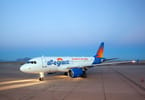BANGKOK, Thailand (eTN) – Indecision on the future of Don Muang airport in Bangkok shows once again the difficulty for Thai politics to work for the sake of the kingdom.
With the official start of the summer timetable, Thai Airways International will officially transfer all its domestic flights from Don Muang airport to its international hub at Bangkok Suvarnabhumi. The airline had previously transferred most of its domestic network to Don Muang just two years ago following the order from the Ministry of Transport. The latter had “suddenly” realized that the brand new airport –opened in September 2006 with much fanfare- was already reaching its saturation point. Thai Airways kept then only a few daily flights from Suvarnabhumi to Krabi, Chiang Mai, Phuket and Samui, destinations showing a high share of transfer passengers. Asking in early 2007 why Thai did not keep at least one or two daily flights to important cities and trade centers such as Udon Thani or Hat Yai from Suvarnabhumi, a previous Thai Airways Vice President confessed that the decision had been taken only by Thai Airways Board of Director, refusing even to answer when asked if the decision did not show a lack of professional knowledge from the board.
Commenting on the current transfer, Pandit Chanapai, executive vice president Marketing and Sales, explains that the decision has long been expected. Thai was losing some Baht 40 million per year (US$ 1.2 million) to operate out of Don Muang. However, loss in transfer passengers was obviously far higher as provincial passengers wishing to fly beyond Bangkok had no choice than opting for competitor Thai AirAsia. The transfer of flights will add up to 2 or 3 million passengers to Thai Airways traffic at Suvarnabhumi.
However, polemic around Don Muang airport is rising again. The Ministry of Transport wanted once more to completely close again Don Muang to scheduled traffic to implement its new “one-policy airport.”
The decision infuriated both remaining low fare airlines, Nok Air and One-Two-Go. Nok Air CEO Patee Sarasin, complained heavily to Thai media that its move two years ago had cost a lot of money. And without being compensated by the Government, it was out of question to move back to Suvarnabhumi. Within the government, members of the Cabinet seemed to be split on the one-airport policy with Prime Minister Abhisit Vejjajiva favouring a dual-airport system for Bangkok. A study –probably the third one in the last four years- has been ordered by the PM to look at both alternatives.
The polemic around both airports show again the incapacity of the political system to let the protagonists –the airlines in this case- deciding on their own what is best for themselves. Thai Airways, Nok Air, Thai AirAsia or One-Two-Go management have probably enough knowledge to take the right decision. The fact to always let political factions interfering in business decisions in Thailand is in fact costing a lot to the country. In the case of air transport, it has so far paralyzed the creation of a real low cost airport, delaying both the conversion of Don Muang into Bangkok low cost gateway and the construction of a proper low cost facility at Suvarnabhumi. Decisions taken by politicians have also influenced Thai Airways’ fleet modernization or Airports of Thailand’s financial and strategic autonomy.
It explains continuous delays to expand Suvarnabhumi airport, to finish the new train system linking the airport to the city or to develop a new terminal at Phuket airport–equipped with crumbling passengers’ facilities.
Thailand government should now put country’s interests first and remain firmly committed to its investment decisions, once adopted. The rule should of course apply to air transport, a sector where competition is fierce. It will then give a strong signal to the air transport community that the Kingdom is truly supporting aviation, a major component of its economy and its tourism industry. Recent announcement at planning of decades long expected Phuket new terminal –now due for completion in 2012- or the launch of Suvarnabhumi second phase- are first steps in the right direction. Delays at the government help indeed competition in Kuala Lumpur, Singapore and tomorrow in Ho Chi Minh City, Hanoi and even in Medan to bite into Thailand’s leading position as Southeast Asia air gateway.
WHAT TO TAKE AWAY FROM THIS ARTICLE:
- Asking in early 2007 why Thai did not keep at least one or two daily flights to important cities and trade centers such as Udon Thani or Hat Yai from Suvarnabhumi, a previous Thai Airways Vice President confessed that the decision had been taken only by Thai Airways Board of Director, refusing even to answer when asked if the decision did not show a lack of professional knowledge from the board.
- In the case of air transport, it has so far paralyzed the creation of a real low cost airport, delaying both the conversion of Don Muang into Bangkok low cost gateway and the construction of a proper low cost facility at Suvarnabhumi.
- It explains continuous delays to expand Suvarnabhumi airport, to finish the new train system linking the airport to the city or to develop a new terminal at Phuket airport–equipped with crumbling passengers' facilities.






















